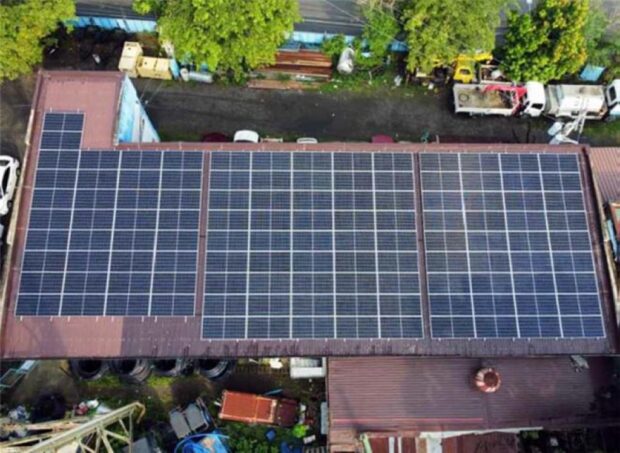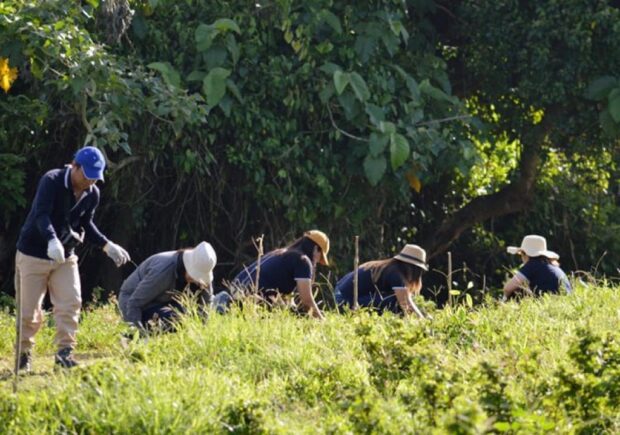Manila Water sustains momentum in hitting sustainability targets

South Luzon Water joins Manila Water’s sustainability drive with on-site solar panels, promising significant electricity cost savings and further reduction in GHG emissions.
MANILA, Philippines — Sustainability remains at the core of Manila Water Company. As it marks 26 years of operations this year, the company is on course with its sustainability targets, operating and delivering world-class facilities and services attuned and responsive to the needs of the communities and stakeholders it serves.
As the first company in the country to produce a Sustainability Report, which has outlined its goals and performance since 2005, Manila Water continues to deliver on its commitments while being mindful of its social and environmental impact.

Pasibol initiative begins as 500 seedlings take root with Laguna Water, Laguna Lake Development Authority, and Santa Rosa Watershed Management Council.
“For 26 years, we have been weaving sustainability principles and practices into our strategies and management systems,” said Manila Water Sustainability Head Sarah Bergado. “We hope to boost long-term financial viability, address the risks, and seize the opportunities through a focused Environmental, Social, and Governance (ESG) lens.”.
Commitments and Progress
Manila Water’s unwavering commitment to sustainability has led to progress in achieving its initial short-term ESG targets, including Water Security, Carbon Reduction and Avoidance, and Capital Expenditures. Building upon these achievements, the Company is expanding its sustainability efforts with a focus on resource efficiency, watershed protection, water quality, and occupational health and safety.
Starting in the second half of 2023, Manila Water is intensifying its water security and climate change mitigation efforts through the Pasibol: Puno ng Pag-asa program. This program involves employees from both the East Zone and Non-East Zone business units, as well as stakeholders, in nurturing and reforesting trees. Manila Water aims to plant and nurture 580,000 trees and reforest 1,000 hectares by 2025, demonstrating its commitment to environmental stewardship.
Article continues after this advertisementFurthermore, Manila Water is driving sustainability by integrating four electric vehicles (EVs) into its fleet, a pivotal move aligned with its ESG and sustainability goals. This transition to eco-friendly transportation is accompanied by comprehensive training programs designed to equip its employees with the knowledge and skills to drive their vehicles in a fuel-efficient manner.
Article continues after this advertisementREAD: Manila Water expands customer base to 7.6 million
Additionally, South Luzon Water has achieved a milestone by installing on-site solar panels, contributing to GHG emissions reduction. Meanwhile, Estate Water, has partnered with Bonifacio Water Corporation to operate its facilities with renewable energy resources, fostering sustainable practices through the Green Energy Option Program. These initiatives mark important steps towards a more sustainable and environmentally responsible future.
Manila Water’s significant investments in the East Zone creating alternative water sources include the Wawa-Calawis Water Supply System, the Kaliwa Dam Project and the Kaliwa River Project, and the East Bay Phase 1 Water Supply System initiatives. The three system initiatives can add 80 MLD for its initial phase, 300 MLD, and 250 MLD more capacity, respectively.
The company is also set to build East Bay Phase 2 water treatment plant (WTP), a new 200 MLD WTP which will provide additional supply of potable water to Metro Manila’s East Zone.
Key investments in wastewater have been made to expand wastewater service coverage within the East Zone and to comply with the Department of Environment and Natural Resources’ environmental protection standards under the Revised General Effluent Standards of 2016 (DAO 2016-08).
Manila Water is currently constructing three sewerage treatment plants and sewer networks to serve portions of Mandaluyong, San Juan, Quezon City, Antipolo, San Mateo, and Rodriguez in Rizal, the San Mateo-Rodriguez Sewerage System, the Hinulugang Taktak Sewerage System Project, the Mandaluyong West Sewerage System, and the North and South Pasig Sewerage Systems to name a few.